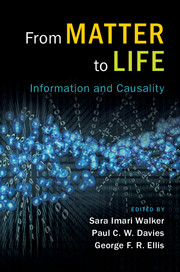Book contents
- Frontmatter
- Contents
- About the authors
- 1 Introduction
- Part I Physics and Life
- Part II Bio from Bit
- Part III Life's Hidden Information
- Part IV Complexity and Causality
- 12 Life's Information Hierarchy
- 13 Living through Downward Causation: From Molecules to Ecosystems
- 14 Automata and Animats: From Dynamics to Cause–Effect Structures
- 15 Biological Information, Causality, and Specificity: An Intimate Relationship
- Part V From Matter to Mind
- Index
13 - Living through Downward Causation: From Molecules to Ecosystems
from Part IV - Complexity and Causality
Published online by Cambridge University Press: 02 March 2017
- Frontmatter
- Contents
- About the authors
- 1 Introduction
- Part I Physics and Life
- Part II Bio from Bit
- Part III Life's Hidden Information
- Part IV Complexity and Causality
- 12 Life's Information Hierarchy
- 13 Living through Downward Causation: From Molecules to Ecosystems
- 14 Automata and Animats: From Dynamics to Cause–Effect Structures
- 15 Biological Information, Causality, and Specificity: An Intimate Relationship
- Part V From Matter to Mind
- Index
Summary
Downward causation (first defined by Campbell, 1974) is both a philosophical concept and an apparent phenomenon of nature attracting great controversy. Most scientists usually assume that all observable phenomena derive from elemental fundamental physics, so that even human behaviours ultimately result from interactions of subatomic particles, via a unidirectional chain of causes and effects. On closer inspection, the act of living seems able to spontaneously generate events, breaking this chain; it is as though life possessed ‘free will’ by acting without a prior physical cause. In this chapter, we analyse this puzzling behaviour using information and control theory as a general framework, applying it to a range of scales of organisation in biological systems: from the molecular to the ecological. An essential element (and possibly a defining feature) of life emerges from this analysis. It is the presence of downward causation by information selection and control. Through a series of examples, we show how this phenomenon works to produce the appearance of autonomous action from information constructed and maintained by the process of living. After a brief introduction to the concept of downward causation, we set it more firmly within the concepts of biological information processing used within this volume. From this we attempt to derive a general classification of causation across scales of biological organisation. We show how selection from random processes and information embodiment in molecules, organism systems, and ecological systems combine to emerge with the properties of downward causation and the appearance of autonomy. These phenomena seem to be exclusive to life.
CAUSATION
What exactly do we mean when we say A causes B? Causal power is attributed to an agency that can influence a system to change outcomes, but does not necessarily itself bring about a physical change by direct interaction with it. In an easily grasped analogy, the Mafia boss says his rival must be permanently dealt with (the boss has causal power), but his henchman does the dirty deed. The action of the henchman is physical and dynamic, and the henchman is logically described at the same ontological level as his victim (it is not the cartel that kills the rival, not the rotten society, not the atoms in the henchman's body, but the henchman himself).
- Type
- Chapter
- Information
- From Matter to LifeInformation and Causality, pp. 303 - 333Publisher: Cambridge University PressPrint publication year: 2017
- 5
- Cited by



